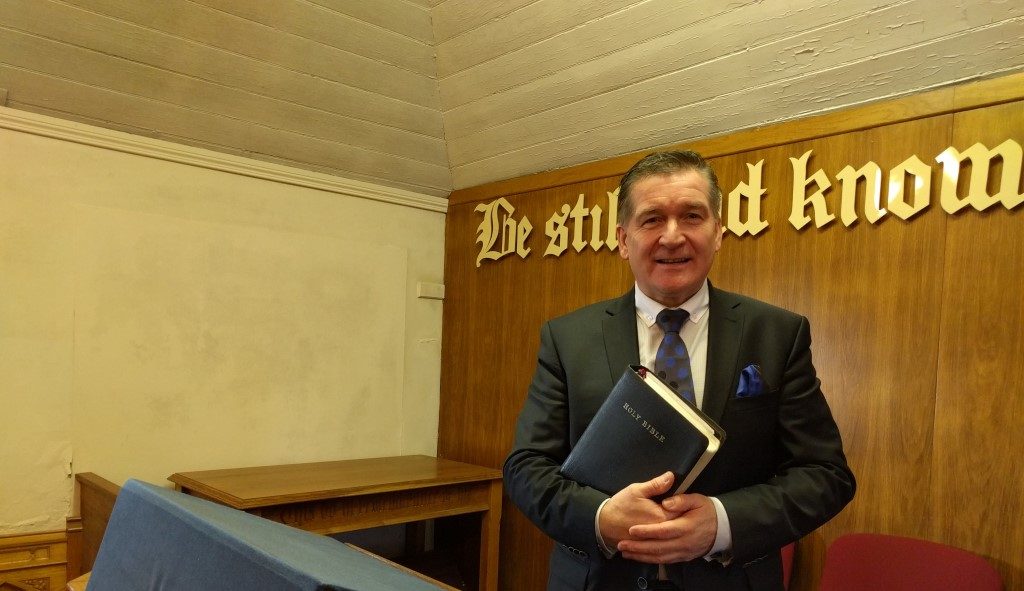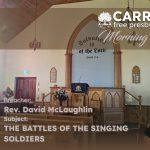Date: WED 8:00 PM 11th June 2025
Singer: Michael Briggs
Preacher: Mr. Noel Shields
Bible Reference: Psalms 113:7-8
7 He raiseth up the poor out of the dust,
and lifteth the needy out of the dunghill;
8 That he may set him with princes,
even with the princes of his people.
Sermon Summary: Psalm 113 – Rescued from the Dunghill
The sermon, delivered with a focus on Psalm 113, centers on the theme of God’s transformative power to rescue sinners from spiritual poverty and degradation, lifting them to a place of honor and glory through salvation in Jesus Christ. The preacher uses vivid imagery, biblical exposition, and a real-life testimony to convey the message of hope, grace, and redemption.
Key Points:
- Scriptural Foundation: Psalm 113
- The sermon opens with a reading of Psalm 113, emphasizing verses 1–8, particularly verse 7–8: “He raises up the poor out of the dust, and lifteth the needy out of the dunghill, that he may set him with princes, even with the princes of his people.”
- These verses highlight God’s ability to elevate the lowly from a state of spiritual destitution (the “dunghill”) to a position of honor among His people. The preacher titles the sermon “Rescued from the Dunghill,” using this imagery to describe the transformation from sin to salvation.
- Illustration: Stuart Hamblen’s Testimony
- The preacher recounts the story of Stuart Hamblen, a former radio personality and son of a Methodist minister who lived a life marked by sin and alcoholism.
- At a gospel crusade, a preacher’s bold declaration that there was a “big fake” in the audience convicted Hamblen, leading him to confront his spiritual state. After visiting the pastor’s home in a drunken state, Hamblen was led to Christ, experiencing a dramatic transformation.
- This change inspired Hamblen to write Christian songs, including the hymn “It Is No Secret (What God Can Do),” penned in just 17 minutes after a conversation with a friend who encouraged him to write about God’s transformative power.
- The preacher uses Hamblen’s story to illustrate that God can take anyone from the depths of sin and despair and make them a new creation, echoing the message of Psalm 113.
- The Spiritual State of the Sinner
- The sermon describes the unsaved sinner as spiritually “poor” and “needy,” likening them to a beggar living on a dunghill—a place of filth, misery, and despair.
- Drawing from Psalm 113:7, the preacher explains that the “poor” and “needy” represent those without Christ, spiritually bankrupt, with no righteousness or goodness of their own (referencing Romans 3:10, Isaiah 64:6, and Revelation 3:17).
- The “dunghill” symbolizes the sinful world—filthy, depressing, and destructive. The preacher emphasizes that sin offers no lasting joy or satisfaction, leaving people hopeless and friendless (Ephesians 2:12).
- The only action a sinner can take is to “beg” for God’s mercy, as illustrated by the publican in Luke 18:13, who cried, “God be merciful to me, a sinner.” Salvation cannot be earned through works or effort (Ephesians 2:8–9); it is entirely by God’s grace.
- The Salvation of the Sinner
- The preacher underscores that only God, through Jesus Christ, can rescue sinners from the “dunghill” of sin. Christ Himself came to this sinful world, not sending an angel but personally taking on human form to die on the cross, shed His blood, and satisfy God’s justice (1 John 4:14).
- Through His death and resurrection, Christ lifts sinners out of their spiritual poverty and despair, as seen in Psalm 40:2: “He brought me up also out of an horrible pit, out of the miry clay, and set my feet upon a rock.”
- The sermon emphasizes Christ’s compassion and love, noting that despite the sinner’s filthiness, God’s “great love” (Ephesians 2:4) motivates Him to save. The preacher highlights that salvation is entirely God’s work, not a joint effort, and that Christ alone is mighty to save (Hebrews 7:25).
- The Exaltation of the Saved
- Beyond rescuing sinners, God exalts them to a place of honor, setting them “with princes, even with the princes of his people” (Psalm 113:8). This signifies being placed among God’s redeemed people, including spiritual giants like Abraham, Isaac, and Jacob (Matthew 8:11).
- The preacher cites 1 Samuel 2:8, which adds that God makes the saved “inherit the throne of glory,” pointing to the ultimate destination of heaven. Revelation 3:21 is referenced, where Christ promises that those who overcome will sit with Him on His throne.
- This transformation—from a beggar on a dunghill to a co-heir with Christ in glory—is described as the “amazing grace” of God, freely given through faith.
- Call to Action
- The sermon concludes with an urgent appeal for sinners to repent, turn from their sin, and trust in Jesus Christ for salvation. The preacher stresses that no one is too far gone, echoing the refrain of Hamblen’s song: “It is no secret what God can do. What He’s done for others, He’ll do for you.”
- Listeners are encouraged to cry out to God for mercy, recognizing their spiritual poverty and inability to save themselves. The preacher warns of the destructive nature of the world and the coming judgment (2 Thessalonians 1:7–8, Matthew 13:49–50), urging immediate response to God’s call.
- The sermon closes with an invitation to seek further guidance from the preacher or others present, emphasizing the urgency of responding to “God’s final call” before it is too late.
Themes and Tone:
- Central Theme: God’s power to rescue sinners from spiritual poverty and degradation, transforming them into heirs of glory through Christ’s redemptive work.
- Tone: Passionate, urgent, and compassionate. The preacher combines vivid imagery (e.g., the “dunghill”), scriptural exposition, and personal anecdotes to drive home the message of salvation.
- Application: The sermon is evangelistic, aimed at both the unsaved, urging them to seek Christ, and the saved, encouraging them to marvel at God’s grace and share the gospel.
Key Takeaways:
- Sin leaves people spiritually bankrupt, living in the filth and misery of a “dunghill.”
- Only Jesus Christ, through His death and resurrection, can rescue sinners and lift them to a place of honor.
- Salvation is entirely by God’s grace, not human effort, and is available to all who call on Christ in faith.
- The sermon calls for immediate response, warning of the destructive nature of sin and the certainty of God’s judgment, while offering hope through God’s transformative love and power.
The sermon ends with the singing of a hymn and an invitation for further discussion, reinforcing the message of hope and urgency in responding to the gospel.
Subscribe to the podcast here:
Spotify Podcasts | Apple Podcasts | Pocket Casts
Email | RSS | more information here








